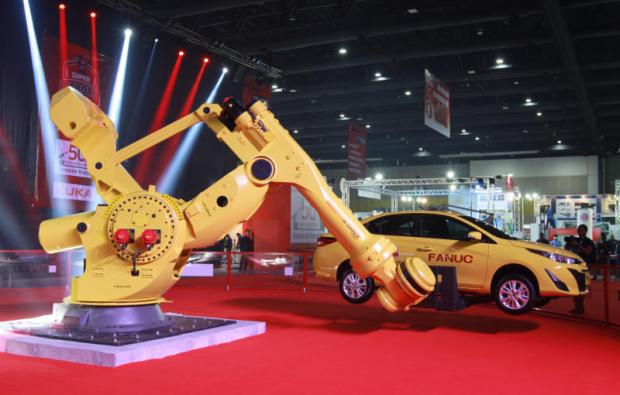
The robotic automation industry is gathering speed and is tipped to generate massive investment in Thailand as investors take advantage of tax incentives.
State-of-the-art technology is expected to be quite common soon in the kingdom and will be produced by Thai companies.
Founder of the Institute of Field Robotics (FIBO) Djitt Laowattana, said the application of robotics automation for Thailand's economic sector is inevitable.
"It is no longer a question whether Thailand will adopt robotic automation, it has become a necessity to incorporate it if we are to remain competitive in the global market and maximise our country's productivity," Mr Djitt said.
Mr Djitt was talking at the METALEX 2017 exhibition, where Fanuc and Kawasaki Robotics from Japan, and Kuka from Germany, exhibited robots to make their debut in Thailand.
Thailand has become the very first country in Asean to introduce this state-of-the-art technology, reflecting its ambitions to become an industrial powerhouse in Southeast Asia.
"We have surveyed 514 factories who use pure labour, labour mixed with automation and also purely automation," Mr Djitt said.
"The statistics we collected suggest that 85% of the factories that refuse to adopt robotic automation will be wiped out in three years."
Of the 514 factories surveyed, 47% were big players in Thailand's industries.
"This means SMEs will face major disadvantages in regard to economies of scale, so must act fast to remain relevant in the manufacturing sector," he said.
Mr Djitt said Thailand will begin to use robotics automation made by Thai companies over the next 10 years, if investments in the technology and infrastructure go according to plan.
The cabinet approved earlier this year a policy gearing Thailand towards automation for commercial purposes.
It is reported that both the public and private sectors have spent a combined amount of more than 130 billion baht to import technology from other countries.
"We have already seen 20 billion baht worth of investments pledged," Mr Djitt said.
"However I forecast that within five years from now we should expect that figure to increase to 100 billion baht."
Thailand provides tax advantages that are far superior than neighbouring countries for automation, he said.
The government has promised that for every 100 baht spent on automation, investors can take 50 baht from that expenditure for tax cuts.
Adopting robotics automation is one of the 10 industrial targets set for the Eastern Economic Corridor.